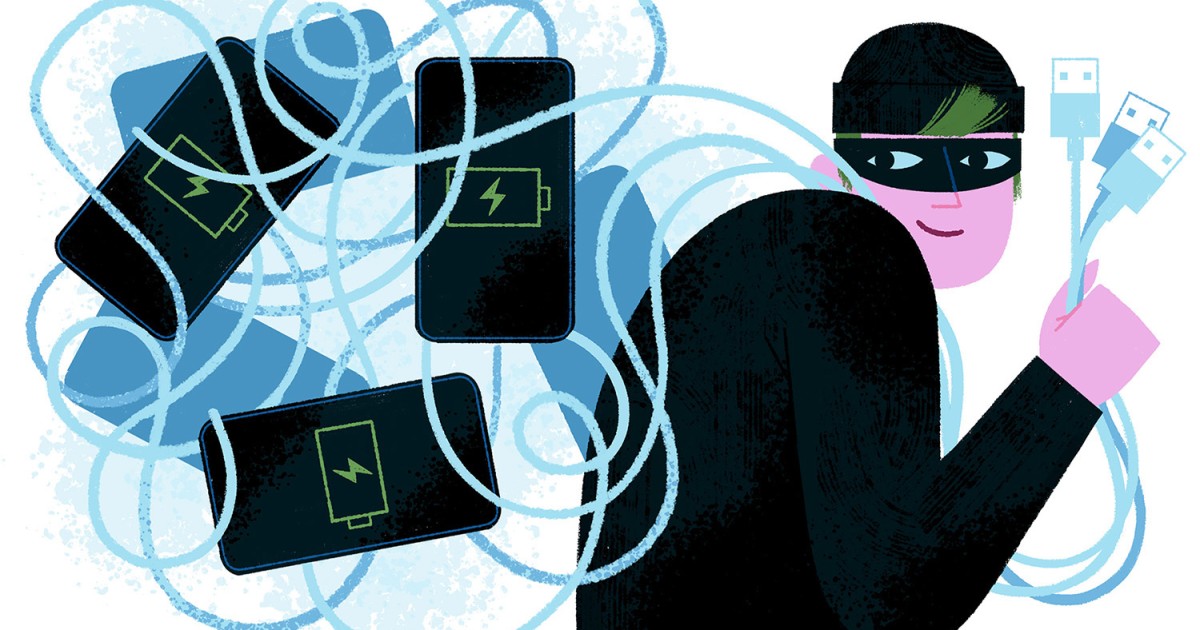
It is known as “juice jacking,” which may well seem as innocuous as a toddler ripping the sippy cup out of a playmate’s palms, but this is incredibly much a grownup problem, unless of course your kid is currently making use of a cellphone.
Juice jacking is the devious exercise by which poor fellas hijack a community USB charging port and use it to steal info from your cell phone or pill.
All those identical ports you’re relieved to locate when your digital system is minimal on energy have come to be a bring about for worry.
This isn’t a new problem, industry experts say, but it has returned to the radar simply because the Los Angeles County District Attorney’s workplace not too long ago warned unsuspecting end users about “criminals [who] load malware onto charging stations or cables they leave plugged in at the stations so they could infect the telephones and other electronic units of unsuspecting buyers.”
If this isn’t new, why is it an problem now? It is not only mainly because it is the time of calendar year when travel is up but also simply because quite a few of us count on those people chargers to get us through extended days of travel, said Ron Culler, senior director of technology and answers at ADT CyberSecurity. (Disclosure: I am a longtime ADT residence-security buyer.)
And listed here I was, Pollyannishly (of course, that is a word) thinking people ports, in airports, on a airplane or in a espresso shop, were just fantastic, outdated-fashioned human kindness, a port in a traveler’s storm.
It is a storm, all right, but that port is no port. If it includes malware coupled with evil intent, it’s no lifeline either. In simple fact, it can be a daily life wrecker.
“Just as you would not plug an unfamiliar USB drive into your notebook, you shouldn’t plug your phone into an unfamiliar USB charger,” Paul Bischoff, a privacy advocate with Comparitech, which presents protection options and assist, reported in an e mail. “Our equipment have less defenses in opposition to attacks from physically connected units than (from) attacks from the net. The malware can also be a lot far more intense with actual physical obtain to components.”
Are these guys attempting to scare us? Just after talking with both equally, I don’t feel so.
Look at how significantly organization we do on our telephones: We purchase airline tickets on our favored provider, and because it’s a lot easier, we go away our credit rating card details on the web-site so we really do not have to reenter it every single time. We established up household payments using our bank’s monthly bill-pay back services. We obtain a barbecue gas grill on a bus commute applying the Wi-Fi on board and, once again, depart credit rating card information on the website.
I am guilty of these things, and I am responsible of 1 a lot more: charging my cellphone wherever I can locate an open port. I vaguely recall executing that just before a latest flight, and I by no means gave it one more believed.
Because, I advised myself immediately after these interviews, is this truly going to take place to me? I have been blessed so far, haven’t I, irrespective of not training superior cyber cleanliness? I suggest, other than the $5,000 in airline tickets an individual charged to my card a few a long time ago. And the observe from LifeLock, which displays my accounts, that my details had appeared on the darkish internet. And there had been the recent modest-dollar deductions from my financial institution account that took me about a thirty day period to observe.
Time to clean up my act, including extra awareness about juice jacking, which can guide to identification theft.
These evildoers know you are “an quick goal when you are traveling,” said Mike Borromeo, vice president of Stericycle, of which Shred-it, the doc destroyer, is element. “You’re in a hurry you just will need a minor power to get you as a result of the flight.”
The implications of this kind of a lapse may direct to co-opted id, he explained, and it can be “one of the worst matters that can happen.” Think about, he mentioned, that you’re striving to obtain a property or a car or truck and your credit has been ruined. Or what if your lender account has been drained?
I’d somewhat not.
Even more, explained Culler of ADT Cybersecurity, you can not generally tell that a little something has took place to your cellular phone. The for a longer time the misuse goes unchecked, the larger the destruction.
Apart from keeping away from people alluring charging details, you can thwart information robbers by utilizing a regular plug in an outlet and your very own charging cable, Culler claimed, or carrying a spare battery charger with you. (Do that anyway just in case your flight is delayed or you still left your map app open and it sucked the everyday living from your cellular phone.)
Retaining on your own protected from these who would damage you? You’ve received the ability.
Have a travel problem, problem or issue? Publish to travel@latimes.com. We regret we can’t solution every single inquiry.




